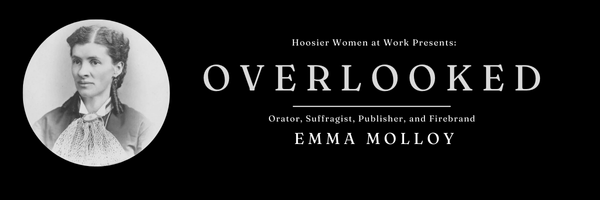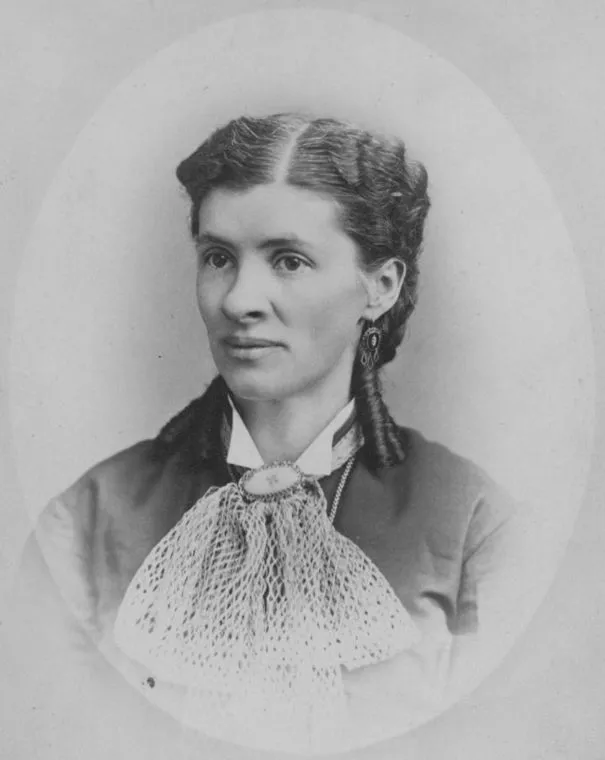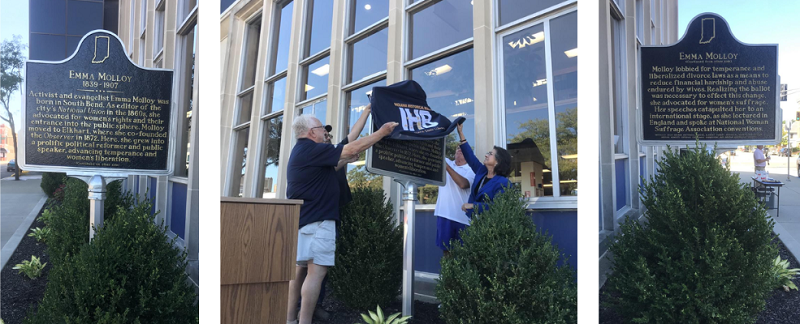
The following post contributes to an IHB blog series celebrating the upcoming presentation by New York Times editor Amisha Padnani on her Overlooked project. Overlooked tells the stories of remarkable women and people of color whose deaths were never reported by the New York Times in its 168-year history.
Learn more and register to attend Padnani’s presentation for free as part of the October 5, 2024 Hoosier Women at Work History Conference.
Emma Molloy was not your average reformer. Her advocacy of women’s suffrage, women in the workplace, temperance, and prison reform was so radical that women’s and reform groups ostracized her. Nevertheless, she continued to write and speak prolifically in the 1870s and 80s, engendering a reputation as “one of the most effective woman orators of the west.”[1]
Born in South Bend in 1839, Molloy’s childhood was a lonely one. Her mother died when she was just eleven, forcing her to live in boarding homes. She found solace in writing and won awards for submissions in local newspapers as a teenager. Around that time, she married a printer, and the couple traveled the country, working various jobs. However, her husband’s alcoholism cost them employment, breeding resentment that he took out on his wife. After his untimely death due to the disease, Molloy committed herself to lobbying for temperance and protecting Indiana divorce laws.

Her second marriage was a happier one, and led to professional and personal fulfillment. She became the business partner of her husband, Edward, helping edit and print the South Bend National Union. Molloy’s editorial influence created a more nuanced publication, as her personal anecdotes and heartfelt obituaries balanced Edward’s political and economic reporting. In addition to writing and managing the household, she undertook business aspects of the publication, which included collecting payment and soliciting advertisements—earning praise from Harper’s Bazaar.
The ambitious Molloys moved to Elkhart, where they co-founded the Observer in 1872. Emma came fully into her own in the city, growing into a prolific political reformer and public speaker. In her editorials, she encouraged women’s independence and entry into the workplace, writing “woman’s true sphere is in any latitude of occupation that she is capable of.” She wrote:
I am told that women are not as thorough on details as men are. Well, let a woman educated as a reporter, walk beside the male reporter, and she will see twice as much in a walk down the street as he will, and can draw just as largely upon her imagination too in reporting it. . . . As for the girls employed in our office, I find them as efficient as men , and much more reliable, for they never get on a spree.[2]
Molloy refused to downplay her contributions. In an address for the Women in Country Journalism Congress, she described the:
. . . many days and nights of persistent toil at the case, in the editorial chair, and sometimes at the press. To help out I have set type all night after working at other branches of the business all day, and I am certain my husband, capable and industrious as he is, would not have been where he is to-day without my aid.[3]
Molloy also used her publications to advocate for women’s right to divorce and the need to abolish “legal marital slavery” through legislation. This, along with temperance, would reduce wives’ financial hardship and abuse. She had been one of these wives herself, after all.
Realizing the ballot was necessary to effect this change, she advocated for women’s suffrage. Her fiery speeches and emphasis on women’s involvement in politics set her apart from other suffragists and temperance leaders at the time. According to the Ribbon Worker, she first demonstrated her “oratorical gifts” in Elkhart, which soon garnered here invitations to speak in various Indiana cities and eventually across the country and abroad. The Rochester Union Spy described one of her lectures as a “feast of reason,” adding:
We were ourself surprised at the breadth of her views, and the profundity of her reasoning. It must be conceded that intellect, as well as virtue, has no sex, and that women who try can reason just as closely and as logically as their brethren.
Similarly, the South Bend Tribune wrote “By reason of her native eloquence and the force of her arguments she attracted large audiences wherever she went.” Molloy not only delivered passionate speeches and editorials, but went door to door, canvassing neighbors for the cause of temperance. This resulted in one Elkhart bar owner throwing eggs at her.
Biographer Martha Pickrell noted that some newspaper editors and WCTU members found Molloy’s strategies and emphasis on women’s political involvement too extreme. In 1877, Molloy wrote to the Woman’s Journal that she had been ousted from local temperance efforts, noting “in my own State, the greater portion of the women of the Union regarded me as ‘dangerous to their work.’” She added that:
God made me so radical and . . . so adverse to suffering that when I see a way to avoid it, for myself or anyone else, I cannot help making a suggestion as to the means, even though it may be shocking to conservative ears.
Perhaps feeling ostracized, she pivoted to prison reform and evangelical preaching. Because of her experiences with those suffering from addiction, she viewed prisoners as humans, worthy of humane conditions and a second shot at life after incarceration. In the late 1870s, Molloy visited Indiana prisons and lobbied for better conditions, such as proper ventilation. She served as a maternal figure for those incarcerated and often encouraged them through correspondence. She wrote “Too often he finds himself thrown upon the world homeless, friendless, illy educated to grapple the with the world. It is very hard for an ex-convict to get employment.” In her efforts to reduce recidivism and help with rehabilitation, Molloy worked with Quakers and WTCU members to establish the Ex-Convicts’ Aid Society, with the goal to create halfway houses in northern and southern Indiana for released prisoners.

In her final years, Molloy moved to the West Coast and undertook the cause nearest to her heart—preaching Christianity. She once again leveraged her public speaking skills, but this time from a church pulpit. Although she could not officially be ordained, she essentially served as a preacher and helped build up struggling churches in smaller towns.
Molloy died in 1907. Her death garnered scant obituaries and one published in her native South Bend misspelled her name. We hope that this Indiana Overlooked profile helps restore the agency and legacy of a woman so ahead of her time. Suffering had not made her bitter, but empathetic, and ready to take up the sword to prevent the suffering of others. For this, she should not only be remembered, but emulated.
For sources used to compile this post, see our historical marker footnotes.
Quotations:
[1] “Well Known Woman Gone,” South Bend Tribune, May 15, 1907, 5, accessed Newspapers.com.
[2] Emma Molloy, Woman’s Congress Address in Chicago, October 1974 in Martha Pickrell, “A Woman in Country Journalism,” Traces of Indiana and Midwest History 12, no. 2 (Spring 2000): 27, accessed Indiana Historical Society.
[3] Emma Molloy, Address on Women in Country Journalism, Woman’s Congress, Chicago, Illinois, October 15-17, 1874, published in Woman’s Journal (November 28, 1874) in Pickrell, p. 93.
